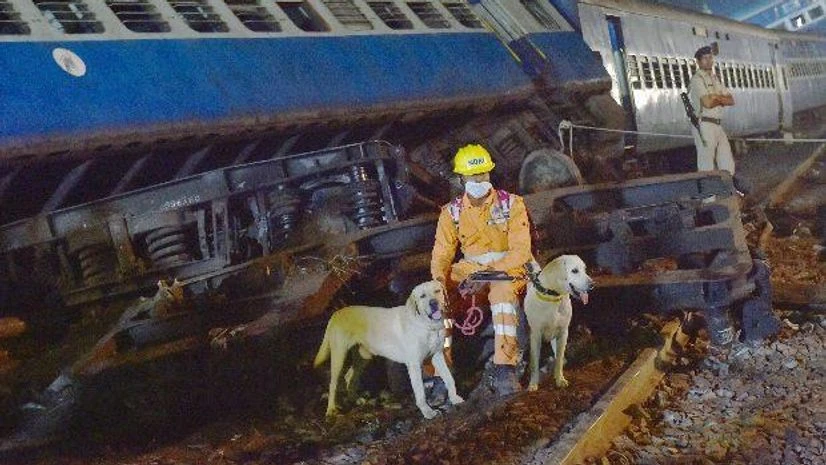Authorities on Sunday admitted to negligence and ground-level lapses that may have derailed the Kalinga Utkal Express train in Uttar Pradesh on Saturday evening claiming 22-24 lives.
Even as a probe to know the exact cause of the train disaster began, a criminal complaint was lodged against unknown people for causing deaths by negligence.
Mohd Jamshed from the Railway Board told the media in New Delhi that lapses in maintenance work being carried out on the track could have caused the accident involving the speeding train at Khatauli in Muzaffarnagar district.
"We did a site inspection. Some track maintenance equipment used for repairs were found at the accident site (apparently left behind by workers)," Jamshed said.
He said the railways were probing the disaster from all angles and a case had been registered for "causing damage or destruction of railway properties, for mischief, for death by negligence, for causing grievous hurt, injuring lives by overlooking safety".
The official said authorities would look into possible sabotage and whether "all precautions were taken" while the repair work was on.
More From This Section
Another railway official requesting anonymity said it appeared that negligence was the prima facie reason for the tragedy. "Action against some senior officials is likely."
At Khatauli, angry locals accused the railways of gross negligence. According to them, workers repairing the tracks left midway because of heavy rains, leaving equipment on the tracks.
To worsen the situation, the local railway station manager claimed he had no idea of the work carried out on the tracks. In the process, the train driver was not alerted to the danger.
In New Delhi, Railway Minister Suresh Prabhu said responsibility for the disaster will be fixed on the strength of prima facie evidence.
The Kalinga Utkal Express was on its way from Puri in Odisha to Haridwar in Uttarakhand when 14 coaches derailed at Khatauli. The accident was so severe that some of the derailed coaches mounted on others.
Senior Superintendent of Police Anant Deo told IANS that 22 people had died: 20 in Muzaffarnagar district and one each in hospitals in Ghaziabad and Meerut where they had been taken by their families. All but two of them had been identified.
Over 150 injured were being treated in Muzaffarnagar and Meerut.
But Jamshed said earlier that 20 people were killed and 92 injured, 22 critically.
A day later, dazed survivors recounted the horrific disaster, saying the death toll would have been much more but for the timely help rendered by residents of Khatauli, some 40 km from Muzaffarnagar town.
Virtually everyone credited the locals with rescuing dozens of trapped passengers from the mangled coaches of the train. Many survived because the locals rushed them to hospitals, much before officials mounted a rescue operation.
Meanwhile, an unverified telephonic conversation apparently between two railway employees circulated on social media also hinted that negligence was the reason of the accident.
One of the men in the audio clip apparently posted near the accident site says that "poor patrolling" on the track where maintenance work was on was one of the causes.
"Welding work was under way at a section of the railway track... but the workers did not fix the block of the track and left it loose. Gates near the crossing were closed. A piece (of the track) was not fixed," one of the employees is heard saying.
"Neither the line, on which the work was under way, was fixed nor they had put any flag or a signboard (as a stop signal). The accident occurred due to negligence. It seems all (concerned employees) will be suspended," he says.
The railways said its staff was working to clear the derailed coaches and repair the damaged tracks as all trains on the route were diverted. The operation to resume services on the track was expected to get over by Sunday night.
A Home Department official said 90 ambulances and four teams of the National Disaster Response Force did rescue work through the night but many relatives of the dead and injured complained of a lack of ambulances.

)
